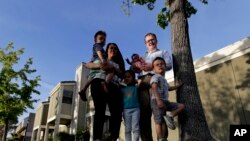Millennials – young people born between 1982 and 2000 – could have more influence than any other group when it comes to this year’s presidential election.
That’s because there is so many of them. Eighty-three million millennials now live in America, according to United States Census Bureau. The number represents one quarter of the U.S. population, and it surpasses the 75.4 million baby boomers, individuals born between 1946 and 1964.
With those numbers, millennials could dominate the election. Except that they mostly don’t vote.
CIRCLE, the Center for Information and Research on Civic Learning and Engagement from Tufts University, estimated that in 2012 when President Barack Obama ran against former Massachusetts governor Mitt Romney, the voter turnout for people between the ages of 18 and 29 was 45 percent.
Historically, young people have had the lowest turnout rates in most U.S. elections.
Millennial participation
Millennials don’t have the greatest reputation. They are often portrayed as lazy, entitled and self-centered.
But organizations like Rock the Vote, the largest nonprofit organization trying to rally young people to the polls since 1990, say that is not the case.
In an op-ed, Rock the Vote president Ashley Spillane, said other factors are to blame for the low turnout, including frustration with political gridlock. Experts also argue that mistrust towards politicians and the feeling that elected officials don’t have their best interests at heart, also result in a lack of motivation to vote by young Americans.
For the past decade, American politics has been synonymous with gridlock. Democrats and Republicans in Congress don’t agree.
Republicans and the Democratic White House are constantly at odds and even at the local level, parties in state legislatures have a hard time reaching compromise.
Analysts point out that for most of their lives, U.S. millennials have witnessed only bickering and stalemate.
Kayleigh Moller, 24, is studying law at the University of Alabama in Tuscaloosa, Alabama.
Moller is a republican who in the last presidential election voted for former Massachusetts governor Mitt Romney. She is also a member of the Alabama Republican Party, has volunteered in republican campaigns and served as the executive director of the Indiana Federation of College Republicans.
“We may not be as loyal to a party, but we see through the pandering and aren't going to be as easily bought by the typical rhetoric. I think if young people start getting out the vote, we could force not only policy change, but change in how candidates campaign as a whole,” she said.
Student debt
College graduates in 2015 became the most indebted ever in U.S. history. According to a study by Mark Kantrowitz, the publisher of Edvisors, a website that helps parents and students find ways to pay for college, the class of 2015 graduated with $35,051 in student debt. The total student debt in the United States has surpassed $1 trillion.
Many young voters, after having borrowed tens of thousands of dollars for their educations, struggle to find jobs. This toxic combination discourages young people and contributes to them not going to the polls on Election Day.
Drew Farrington, 24, is also a law student but at the Indiana University Robert H. McKinney School of Law in Indianapolis, Indiana.
Farrington is a law clerk at a state government agency. A Democrat, he voted for Obama in 2012 and volunteered in his campaign. He has also supported Democratic congressional candidates’ campaigns in Indiana.
Farrington blames the lack of participation, partly, on the difficulty of many young voters to find jobs.
“We're emerging into a work force very different from what our parents saw decades ago. Coming out of the Great Recession, there is a sense of pessimism that some young people have with regards to our economic future and opportunity. A bachelor's degree isn't worth what it was 20 years ago, and a lot of young professionals are struggling,” he said.
A trust problem
Millennials do not trust politicians and government institutions.
In the latest poll of millennials’ political views by the Institute of Politics of Harvard University only 37 percent of 18 to 29-year-olds trusted the president. Only 25 percent trust the federal government and only 17 percent trust Congress.
“America's millennial generation, the largest generation in American history, has an opportunity to play a huge role in any election – in particular, the 2016 presidential. However, young adults have a mistrust for today's Washington and are dubious politics can achieve real results,” said Esten Perez, Communications Director of Harvard's Institute of Politics.
This lack of trust, Farrington said, also results in apathy.
“Young people, like a lot of others in our country right now, are fed up with both parties and don't think anyone can implement positive change. When people decide no one can help, why vote?” he asked.










